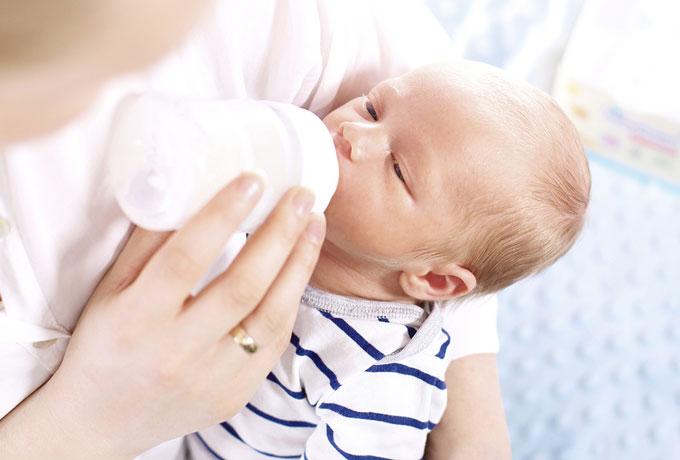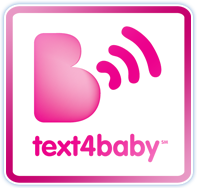
Infant formulas are nutritious and well accepted. The American Academy of Pediatrics currently recommends the use of an iron-containing formula for all bottle-fed babies until the end of the first year of life. In line with this, we do not recommend the use of cow’s milk in the first year. Two formulas with the longest record of use are Similac Advance and Enfamil Lipil.
Bottle-Feeding Suggestions
Formula comes in three different preparations. Powdered formula allows you to mix up exactly what you need and there is little waste. The Concentrate requires that you add water and prepare a fixed amount of formula. The Ready To Feed only requires that the can be opened. The Concentrate and Powdered formulas are both less expensive than the Ready To Feed and have the added benefit of providing fluoride when prepared with tap water. Babies using exclusively Ready To Feed will require fluoride supplementation beginning at 6 months. Read the instructions and expiration date on each can prior to use. It is very important to always add water to any formula that is not Ready To Feed.
We recommend the use of an iron-containing formulas. Iron in formula has NOT been proven to cause constipation, spitting up, or colic. Low iron formulas can cause iron deficiency which can lead to learning problems and. Some babies require the use of a special formula, but we encourage you to discuss this with us before changing your baby’s formula. Because of the lack of DHA and ARA we no longer recommend Enfamil with Ironâ .
If you have utility district water, we do not usually recommend boiling water or sterilizing bottles. If you have well or spring water, please sterilize the bottles and boil the water for about three months. After that point, you may generally stop if the water has been approved by the Health Department.
There are many types of bottles and nipples on the market. Your choice relates in general, only to convenience, expense, and personal preference. Babies who are breastfed sometimes prefer NUK, Avent, Playtex nurser nipples.
Use each bottle and nipple only for one feeding before cleaning. The baby’s saliva causes bacteria to multiply and may contaminate the nipple or bottle contents.
Most babies drink 1-3 ounces every 3-4 hours by 3 days of age and gradually increase that amount over the next few months.
Do not prop the baby’s bottle. Feeding while lying down is felt to sometimes cause ear infections and also increases the risk of choking.
Do not microwave your baby’s bottle since it does not heat evenly and may lead to serious burns.
Do not put your baby down for sleep with a bottle of formula or juice. This often becomes a bad habit that leads to a type of severe tooth decay called “milk-bottle caries.”
Do not use vitamins and iron with your baby’s formula unless instructed to do so.
We do not normally recommend the use of cereal or any other solid foods until at least 4 to 6 months of age.
Nighttime Feeding Schedules
For your later convenience, please wake your baby to nurse or bottle-feed at least every 4 hours in the daytime. Unless you have received other instructions, do not awaken the baby to eat at nighttime. We feel this contributes to more appropriate sleeping habits. You may also help your baby to sleep all night at an earlier stage by controlling the light and noise in his environment. Keep his surroundings bright and stimulating in the daytime and dim and quiet during the nighttime feedings.
Bowel Movement Patterns
Bowel movement patterns vary widely, particularly in breastfed babies, from one stool every 2 to 3 days to 4 to 5 small stools per day. Having more than 3 or 4 large, loose stools daily may be common.
Your baby’s first stool is a black or green tarry substance called meconium. This may persist for 2-3 days. Breast fed babies stools will become yellow, seedy and loose within 4-5 days of delivery. They may have 2 to 8 loose stools a day. This is not diarrhea and is actually a good sign since it tells us the baby is getting plenty of breast milk. If your baby is not having yellow stools by 5 days of age you should call our office, since it may be a sign that they are not getting enough breast milk.
Formula fed babies often have less frequent stools, usually 1-4 per day. Their stools tend to be a pasty consistency and may vary from brown to green to yellow colored. Don’t be alarmed by the variation.
Constipation is the passing of hard rock-like stools with discomfort. If your child grunts or strains to have a bowel movement but then has a soft stool, he is not constipated and does not need treatment. Breasts fed babies almost never get constipated, but may grunt and cry because they don’t like the sensation of having a bowel movement. It is not abnormal for a baby to strain and redden prior to having a stool. This will get better as they get older. A stool that consists of hard pellets passed with discomfort is considered to be a sign of constipation. If your infant is having hard stools and seems uncomfortable, please call the office. In general, calls regarding constipation are not emergencies and should be made in the daytime when the office is open.
The information and content on our website should not be used as a substitute for medical treatment or advice from your doctor.




